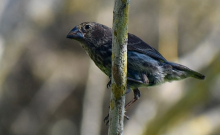Evolutionary biologists have long suspected that the diversification of a single species into multiple descendent species – that is, an “adaptive radiation” – is the result of each species adapting to a different environment. Yet formal tests of this hypothesis have been elusive owing to the difficulty of firmly establishing the relationship between species traits and evolutionary “fitness” for a group of related species that recently diverged from a common ancestral species.


Wild populations must continuously adapt to environmental changes or risk extinction. For more than fifty years, scientists have described instances of “rapid evolution” in specific populations as their traits (phenotypes) change in response to varying stressors. For example, Spanish clover has developed a tolerance for copper from the mine tailings in which it grows, and the horn size of Alberta bighorn sheep has decreased due to trophy hunting.

Are human disturbances to the environment driving evolutionary changes in animals and plants? A new study conducted by McGill researchers finds that, on average, human disturbances don’t appear to accelerate the process of natural selection. While the finding may seem reassuring, this unexpected pattern could reflect the limited number of species for which data were available.

Even for the most common processes, such as changes in population size or food chains, ecologists must take evolution into consideration, researchers say. “Everybody realized rapid evolution was occurring everywhere,” says evolutionary ecologist Andrew Hendry of McGill University.

By Melody Enguix
When scientists from McGill University learned that some fish were proliferating in rivers and ponds polluted by oil extraction in Southern Trinidad, it caught their attention. They thought they had found a rare example of a species able to adapt to crude oil pollution.

